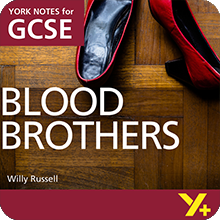Examiner's Notes
You assessed this answer as Grade 4.
Hover over the highlighted text to read the examiner’s comments.
Question: How does Russell present love through the relationships that Linda has with Mickey and Edward in Blood Brothers?
Write about:
- the relationship that Linda has with each of the boys
- how Russell presents ideas about love in these relationships.
It is clear that Mickey and Linda already have a close relationship when Edward appears. We see Linda protecting Mickey from the other children – ‘Leave him alone!’ – and helping him deal with his emotions. When they play with Edward, Russell shows that they are a team, leading him on to believe stories of their adventures, until they’re confronted by a real policeman. At this point, Edward’s admiration is aimed at both Mickey and Linda equally: Russell seems to be showing us all that Mickey and Linda have in common, as if they are a natural pair.
However, as the boys grow, the relationships shift. Russell makes it clear that the teenage Mickey is uncomfortable expressing his feelings. Mrs Johnstone teases him for talking about Linda in his sleep, suggesting his hidden emotion, but he can’t show it easily: when Linda openly declares her love, he responds angrily: ‘Shut up! Y’ always sayin’ that.’ Mickey can only say what he wants when Linda is not there to hear it. His inability to return her affection reflects stereotypical views of boys not being ‘soppy’, but this is contrasted immediately after with Edward’s ability to wear a locket without embarrassment. There are other hints that there will be trouble: Linda thinks Edward (not recognising him at first) is ‘gorgeous’, ‘lovely lookin’’. Edward is well educated and is more comfortable with expressions of love, but as he tries to teach Mickey how to speak to Linda, Russell hints that his own feelings are very similar to his friend’s.
At first, Russell presents the relationship between the three as idyllic through a silent montage of their teenage years: we see them at the fairground, enjoying life, growing up together. This is an idealised vision of love, with no rivalry and no reality to spoil their innocence. But Russell uses the Narrator to make clear there is trouble ahead for ‘the girl in the middle of the pair’, that future happiness is conditional, ‘only if the three of them could stay like that for ever’. Edward does not initially recognise his own conflicting emotions – his love for Linda, and his loyalty to Mickey, who he encourages to ask Linda out. As Edward leaves them kissing and hugging, it seems like this natural pair have finally found each other. But the fact that Edward has asked to write to Linda sets up the closeness that will develop between them and lead to Mickey’s envy.
In the end, however, a combination of factors ruins their innocent love as a trio: the harsh reality of pregnancy and job losses, Mickey’s depression, Edward’s contrasting success. When Mickey says he wants to be ‘invisible’, it’s too much for Linda, and the Narrator reminds us of the ‘girl inside the woman/Who’s waiting to get free’. Time with Edward is a chance to escape the unhappiness of her life, but Russell seems to make clear they are still ‘just friends’, not being ‘cruel’ to Mickey, who they both love, just looking for a ‘light romance’. Ultimately, however, it is Mrs Lyons who stirs up Mickey, though Russell never makes clear her motivation, leaving the audience to guess.
The play’s focus is on Edward and Mickey, and it ends with their mother singing, reminding us of the brotherhood they never knew was biological. But Russell also makes sure that Linda is in this final scene, with stage directions that she ‘runs down the aisle’ to their fallen bodies. Although she has no words to say, the fact that she is on stage gives her a powerful presence, reminding us also that it is because of love for her that the brothers are tragically dead.
